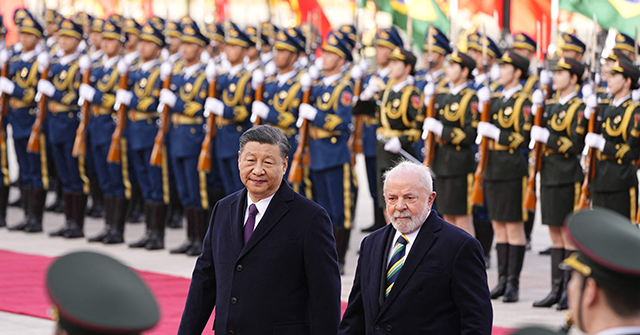Radical leftist Brazilian President Luiz Inácio Lula da Silva signed 15 agreements with genocidal communist Chinese dictator Xi Jinping during an in-person summit in Beijing on Friday, vowing cooperation on everything from space exploration to news media.
The two leaders met on Lula’s last scheduled day in the country. Lula arrived on Wednesday in Shanghai to meet with business leaders, tour the headquarters of the controversial Chinese telecommunications company Huawei, and attend the inauguration of his protege, disgraced former Brazilian President Dilma Rousseff, as the head of the BRICS New Development Bank. BRICS is an economic and geopolitical alliance consisting of Brazil and China alongside India, Russia, and South Africa. The Development Bank is meant to compete to offer funds to poor countries against the World Bank and International Monetary Fund (IMF), which communist regimes consider overly influenced by America.
“For a long time, developing countries have had a dream to create their own investment and financing tools. The New Development Bank has realized such a dream, for it really knows what developing countries need and where they need to invest,” Lula said at the event on Wednesday, according to China’s state-run Xinhua News Agency.
Com o presidente da China, Xi Jinping. 🇷🇳
📸: @ricardostuckert pic.twitter.com/TTUJmtQjYe
— Lula (@LulaOficial) April 14, 2023
The Brazilian newspaper O Globo listed 15 agreements signed by Xi and Lula on Friday, some vague agreements to “cooperate on research and innovation” in technology, or to establish a “working group to facilitate commerce” between the two countries, and others more specific. Three of the agreements appear to involve media and communications. One memorandum committed the two countries to cooperation between the Brazilian National Telecommunications Agency and the Chinese Ministry of Industry and Technology. Another document was described as a “memorandum of understanding between the Chinese media group and the Institutional Relations Secretariat of Brazil.” A third was a cooperation agreement between China’s flagship state propaganda news outlet, Xinhua, and the Brazilian Communications Company (EBC).
The deal linking Brazil’s state news company, the country’s equivalent of America’s PBS or the U.K.’s BBC, to Xinhua is of particular note because it allows China to use its state arms to infiltrate communications messaging in the South American country. In 2018, Xi Jinping ordered Chinese propagandists to abandon their “pompous style” and recalibrate their messaging to be more attractive to international audiences and thus sway global support for China. Beijing invested heavily in courting international news agencies with deals to run government-produced content, particularly from Xinhua.
Brazilian President Luiz Inacio Lula da Silva speaks highly of Brazil-China relations, BRICS cooperation https://t.co/mdLAG21BtW pic.twitter.com/EzA6MWdPWf
— China Xinhua News (@XHNews) April 14, 2023
In 2021, a study by the International Federation of Journalists (IFJ) found that Beijing used such content-sharing deals to exponentially increase the Communist Party’s reach for messaging that absolved China of responsibility in the Wuhan coronavirus pandemic, which resulted from gross Party mismanagement of the initial outbreak.
Another of the 15 agreements signed between Xi and Lula on Friday concerned “television co-production,” according to O Globo. Reports, shared online by Lula, suggest the deals are worth over 50 billion Brazilian reais (about $10 billion) in total.
In remarks during their meeting, Xi heavily emphasized commercial ties and diplomatic cooperation. While not mentioning the United States directly, Xi implied that the far-left Brazilian president could help China reconstitute the global order to its benefit, diminishing American influence.
“Facing global changes of a magnitude unseen in a century, China and Brazil are resolved to stand on the right side of history, practice true multilateralism, advocate the common values of humanity,” the Chinese Foreign Ministry paraphrased Xi as saying, “work for a more just and equitable international governance system truly safeguard the common interests of developing countries and international justice and equity, and build a community with a shared future for mankind.”
Xi stressed that China views its relationship with Brazil as a “high priority on its diplomatic agenda.”
The Chinese Foreign Ministry depicted Lula as receptive to Xi’s overtures.
Mais cedo, estive na Cerimônia de Deposição Floral no Monumento aos Heróis do Povo (Praça da Paz Celestial) e me reuni com o primeiro-ministro Li Qiang, no Grande Palácio do Povo. Vamos trabalhar pela ampliação do comércio e equilibrar a geopolítica mundial.
📸: @ricardostuckert pic.twitter.com/SIaJ9MyEhG
— Lula (@LulaOficial) April 14, 2023
“President Lula said he was honored and proud to head a large delegation on his fourth visit to China. This is his first visit outside the Americas since being elected President last year. This choice reflects Brazil’s affection for China and commitment to Brazil-China relations,” the ministry related. “China is an indispensable force in global politics, economy and trade, science and technology, and plays a vital role in promoting world peace and development.”
“Brazil is committed to building closer relations with China from the strategic perspective of shaping a just and equitable international order,” Lula reportedly vowed.
The two also reportedly discussed the ongoing Russian invasion of Ukraine. China is one of Russia’s closest allies and Lula has publicly both supported the Russian military action and disparaged Ukrainian President Volodymyr Zelensky – going a step further than the Chinese leadership, which is nominally also allied with Ukraine.
“Both sides agreed that dialogue and negotiation is the only feasible way for settling it and that all efforts that are conducive to its peaceful resolution should be encouraged and supported,” according to the Chinese Foreign Ministry. “They appealed to more countries to play a constructive role for a political settlement of the Ukraine crisis. The two presidents agreed to stay in communication on the issue.”
Follow Frances Martel on Facebook and Twitter.


